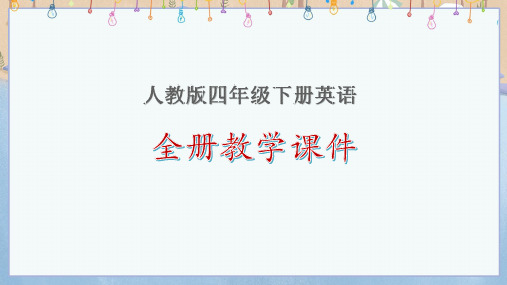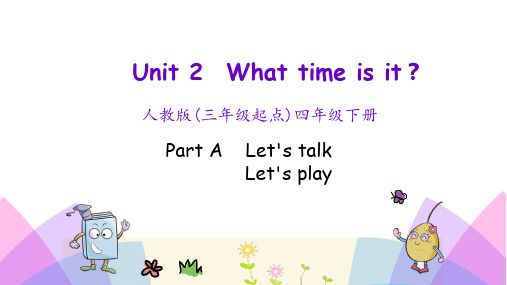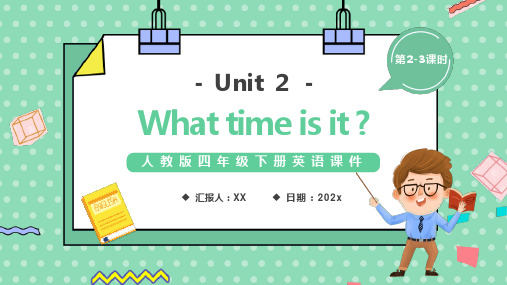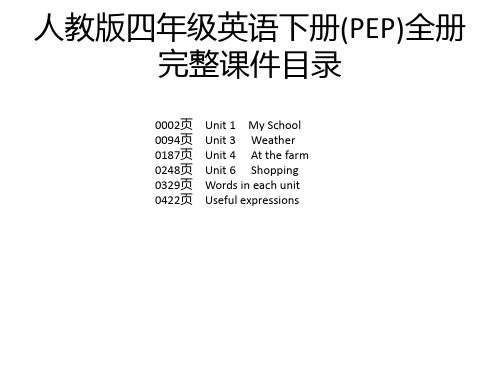最新人教版四年级英语(下)pppt课件
合集下载
人教版四年级下册英语全册教学课件全文

人教版四年级下册英语
全册教学课件
Unit 1 My school
人教版(三年级起点)四年级下册
Part A Let's talk Look ,ask and answer
● Let's talk
● Look, ask and answer
● Let's learn
● Let's do
Warm-up/Revision
Free talk
It's on the second floor.
Where's the teachers' office?
Presentation
/ˈlaIbrəri/
(名词)图书馆
【复数形式】
libraries
Warm-up
Let's sing
Our schoolThis is the way I go to school, go to school, go to school.This is the way I go to school, where I like to learn all day.This is the classroom in my school, in my school, in my school.This is the classroom in my school, where I like to learn all day.
【回答】
主语 + be动词(is/are) + 介词 + 地点.
Where' the library?
It's next to Class 2.
Where's ...?It's...
全册教学课件
Unit 1 My school
人教版(三年级起点)四年级下册
Part A Let's talk Look ,ask and answer
● Let's talk
● Look, ask and answer
● Let's learn
● Let's do
Warm-up/Revision
Free talk
It's on the second floor.
Where's the teachers' office?
Presentation
/ˈlaIbrəri/
(名词)图书馆
【复数形式】
libraries
Warm-up
Let's sing
Our schoolThis is the way I go to school, go to school, go to school.This is the way I go to school, where I like to learn all day.This is the classroom in my school, in my school, in my school.This is the classroom in my school, where I like to learn all day.
【回答】
主语 + be动词(is/are) + 介词 + 地点.
Where' the library?
It's next to Class 2.
Where's ...?It's...
人教PEP版英语四年级下册Unit 2 全部教学PPT课件

/ˈdInə(r)/
【dinner与super】
dinner通常有两种解释,正餐或宴会(比较正式的、会喝酒的那种)。可以是午餐,也可以是晚餐。
supper就是晚餐,较随意的那种(来自法语的“汤”)。需要注意的是,当中午是正餐(dinner)时,晚餐就可以用supper。
游戏时间
Bomb Game
B
B
A
A
重点词汇
over 结束
now 现在
o'clock (表示整点)……点钟
kid 小孩
Sum-up
重点句型
Homework
Unit 2 What time is it?
人教版(三年级起点)四年级下册
Part A Let's learn Let's do
【回答】
主语 + be动词(am/is/are) + 介词 + 地点.
Where are your parents?
They're in Beijing.
你的父母在哪里?
他们在北京。
Practice
7:00
— What time is it?
— It's 7 o'clock. It's time for breakfast.
Test
一、选出不同类的单词。
( )1. A. breakfast B. time C. lunch D. dinner( )2. A. classroom B. music C. English D. P E( )3. A. chicken B. rice C. breakfast D. milk( )4. A. sing B. jump C. run D. gym( )5. A. ten B. too C. one D. four
【dinner与super】
dinner通常有两种解释,正餐或宴会(比较正式的、会喝酒的那种)。可以是午餐,也可以是晚餐。
supper就是晚餐,较随意的那种(来自法语的“汤”)。需要注意的是,当中午是正餐(dinner)时,晚餐就可以用supper。
游戏时间
Bomb Game
B
B
A
A
重点词汇
over 结束
now 现在
o'clock (表示整点)……点钟
kid 小孩
Sum-up
重点句型
Homework
Unit 2 What time is it?
人教版(三年级起点)四年级下册
Part A Let's learn Let's do
【回答】
主语 + be动词(am/is/are) + 介词 + 地点.
Where are your parents?
They're in Beijing.
你的父母在哪里?
他们在北京。
Practice
7:00
— What time is it?
— It's 7 o'clock. It's time for breakfast.
Test
一、选出不同类的单词。
( )1. A. breakfast B. time C. lunch D. dinner( )2. A. classroom B. music C. English D. P E( )3. A. chicken B. rice C. breakfast D. milk( )4. A. sing B. jump C. run D. gym( )5. A. ten B. too C. one D. four
What time is it 人教版四年级下册英语PPT课件

Practice
John: Hi! School is _o_v_er__. Let’s go to the _p_l_a_y_g_ro_u__n_d_ .
Wu: _O__K__ .
John: What time is it _n_o_w__? Wu: It’s 5 o’clock.
Guard :Time to __g_o__h_o_m__e_,kids. John: __W__h_a_t__ti_m_e__is__it__ ? Guard : It’s 6:00. It’s time for _d_i_n_n_e_r_ . John & Wu : Oh! Let’s __g_o___!
Time 7:00 9:00 10:00 12:00 2:00 3:00 6:00
subject breakfast English class Chinese class
lunch music class
PE class dinner
Presentation
What time is it now?
- Unit 2 -
第2-3课时
What time is it ?
人教版四年级下册英语课件
汇报人:XX
日期:202x
第2课时
Let’s talk
Warm-up
Talk something about the schedule.
What time is it?
It’s __7__:0_0_. It’s time for __b_r_e_a_k_fa_s_t .
Production
It’s 10:00 _a_.m__. in New York.
(上午)
人教PEP版英语四年级下册Unit 4 全部教学PPT课件

小结
发音要领:
在一些单词中,字母组合“or”发/ɜː/音。
舌身平放,舌中部伸向 硬腭,但不要接触到硬腭,舌部肌肉紧张;双唇稍稍张开,位置和发[iː]时相似;这个音听起来和汉语的"饿"相似,要注意的是在美国英语中该音后常常加上一个r的音,类似北京方言的儿发音。
小结
Practice
I like to read the story.The story about the horse.The horse likes to work.He works hard of course.
— Are these carrots?这些是胡萝卜吗?— Yes, they are.是的。
【一般疑问句句型结构】 Be动词(Is/Are) + 代词 + 名词?
【肯定回答】 Yes,主语 + be动词(is/are).
【否定回答】 No,主语 + be动词(is/are) + not.
Are these pencils?
I like tomatoes.我喜欢西红柿。
【句型结构】主语 + like/likes + 名词.
【例句】
I like bananas.我喜欢香蕉。
Test
一、选出不同类的单词。
( )1. A. tomato B. big C. potato ( )2. A. apple B. library C. gym ( )3. A. green B. yellow C. onion( )4. A. horse B. tiger C. carrot ( )5. A. fork B. sunny C. rainy
【例句】The soup tastes yummy. 汤很美味。
发音要领:
在一些单词中,字母组合“or”发/ɜː/音。
舌身平放,舌中部伸向 硬腭,但不要接触到硬腭,舌部肌肉紧张;双唇稍稍张开,位置和发[iː]时相似;这个音听起来和汉语的"饿"相似,要注意的是在美国英语中该音后常常加上一个r的音,类似北京方言的儿发音。
小结
Practice
I like to read the story.The story about the horse.The horse likes to work.He works hard of course.
— Are these carrots?这些是胡萝卜吗?— Yes, they are.是的。
【一般疑问句句型结构】 Be动词(Is/Are) + 代词 + 名词?
【肯定回答】 Yes,主语 + be动词(is/are).
【否定回答】 No,主语 + be动词(is/are) + not.
Are these pencils?
I like tomatoes.我喜欢西红柿。
【句型结构】主语 + like/likes + 名词.
【例句】
I like bananas.我喜欢香蕉。
Test
一、选出不同类的单词。
( )1. A. tomato B. big C. potato ( )2. A. apple B. library C. gym ( )3. A. green B. yellow C. onion( )4. A. horse B. tiger C. carrot ( )5. A. fork B. sunny C. rainy
【例句】The soup tastes yummy. 汤很美味。
人教版四年级英语下册(PEP)全册完整课件

人教版四年级英语下册(PEP)全册完 整课件
Unit 5 My clothes
人教版四年级英语下册(PEP)全册完 整课件
Unit 6 Shopping
人教版四年级英语下册(PEP)全册完 整课件
Recycle 2
人教版四年级英语下册(PEP)全册完 整课件
Words in each unit
人教版四年级英语下册(PEP)全册完 整课件
Vocabulary
人教版四年级英语下册(PEP)全册完 整课件
ቤተ መጻሕፍቲ ባይዱ Useful expressions
人教版四年级英语下册(PEP)全册完 整课件
人教版四年级英语下册(PEP)全册 完整课件目录
0002页 0094页 0187页 0248页 0329页 0422页
Unit 1 My School Unit 3 Weather Unit 4 At the farm Unit 6 Shopping Words in each unit Useful expressions
Unit 1 My School
人教版四年级英语下册(PEP)全册完 整课件
Unit 2 What time is it?
人教版四年级英语下册(PEP)全册完 整课件
Unit 3 Weather
人教版四年级英语下册(PEP)全册完 整课件
Recycle 1
人教版四年级英语下册(PEP)全册完 整课件
Unit 4 At the farm
Unit 5 My clothes
人教版四年级英语下册(PEP)全册完 整课件
Unit 6 Shopping
人教版四年级英语下册(PEP)全册完 整课件
Recycle 2
人教版四年级英语下册(PEP)全册完 整课件
Words in each unit
人教版四年级英语下册(PEP)全册完 整课件
Vocabulary
人教版四年级英语下册(PEP)全册完 整课件
ቤተ መጻሕፍቲ ባይዱ Useful expressions
人教版四年级英语下册(PEP)全册完 整课件
人教版四年级英语下册(PEP)全册 完整课件目录
0002页 0094页 0187页 0248页 0329页 0422页
Unit 1 My School Unit 3 Weather Unit 4 At the farm Unit 6 Shopping Words in each unit Useful expressions
Unit 1 My School
人教版四年级英语下册(PEP)全册完 整课件
Unit 2 What time is it?
人教版四年级英语下册(PEP)全册完 整课件
Unit 3 Weather
人教版四年级英语下册(PEP)全册完 整课件
Recycle 1
人教版四年级英语下册(PEP)全册完 整课件
Unit 4 At the farm
- 1、下载文档前请自行甄别文档内容的完整性,平台不提供额外的编辑、内容补充、找答案等附加服务。
- 2、"仅部分预览"的文档,不可在线预览部分如存在完整性等问题,可反馈申请退款(可完整预览的文档不适用该条件!)。
- 3、如文档侵犯您的权益,请联系客服反馈,我们会尽快为您处理(人工客服工作时间:9:00-18:30)。
Is this the teachers' office?
It's next to the art room.
No,it isn't.It's the computer room.
Do you have an art room?
Oh,no!That's my library!.
Yes.It's on the second floor.
(twenty-second)
.
序数词缩写: first, second, third 通常可缩写为1st, 2nd, 3rd。 凡是以th结尾的序数词可缩写为“基数词+th”。如:4th, 5th, 9th, 11th, 60th, 128th等。 第二十一 twenty-first 第二十二twenty-second 第二十三
.
.
重点句型讲解
Is this the teachers' office? 由be动词is引导的一般疑问句,意为“这是....吗?” 用来确认近处物体的名称。 其结构为:Is this + 物品名称? 肯定回答为:Yes,it is.(是的。) 否定回答为:No,it isn't.(不,不是。) Is this your pen? 这是你的钢笔吗? Yes,it is.是的。/ No,it isn't. 不,不是。
.
computer room [kəm'pjuːtə ruːm]
.
art room [ɑːt ruːm]
.
music room ['mjuːzɪk ruːm]
.
homework ['həʊmwɜːk]
.
class [klɑːs]
.
方位介词
.
.
Look !That's the playground. Where's the library?
.
Let' do
.
.
.
.
.
.
句型练习:
.
.
.
.
.
.
.
序数词变化规律
基变序有规律 一,二,三,特殊记,词尾各是t , d , d . (one→first, two→second, three→third) 八去t , 九去e , 五和十二很容易,f来把ve替, 遇到整几十,改y为ie,末尾仍加th (eight→eighth,nine→ninth,five→fifth, twelve→twelfth,twenty→twentieth, thirty→thirtieth) 若是遇到几十几,只变各位就可以。
重点句型讲解
Where's the library? where 意为“在哪里”,用来引导特殊疑问句, 表示对地点的询问。 “Where + is / are +主语?” 表示“....在哪里?” Where are the keys? 钥匙在哪里?
注意:where ห้องสมุดไป่ตู้s =where's where are =where're
.
Chen Jie:Welcome to our school! This is my classroom.
Visitor :It's so big.How many students are there in your class?
Chen Jie:Forty-five students. Visitor :Is that the computer room? Chen Jie:No,it isn't.It's the teachers' office. Visitor :Do you have a library? Chen Jie:Yes,we do.It's on the second floor.
.
Where's the library?
It's on the first floor.
Is it next to the teachers' office?
teachers' office
Yes,it is. second floor
library .
first floor
This is my school.
Cool! Do you have a music room?
Yes,we do.It's on the first floor.
.
重点句型讲解
Do you have a library? 由助动词do 引导的一般疑问句,do 在句中没有 任何实际意义。 结构为Do you have +物品名称? 意为“你/你们有....吗?” 肯定回答:Yes,I /we do. 否定回答:No,I /we don't. Do you have a garden? 你们有花园吗? Yes,I /we do. 是的,我们有。 No,I /we don't. 不,我们没有。
This way ,please.
.
重点句型讲解
How many students are there in your class? how many 意为“多少”,用来询问可数名词的 数量 How many apples are there on the tree ? 树上有多少个苹果? 注意:当询问不可数名词的数量时要用 how much How much money do you have? 你有多少钱?
twenty-third 第二十 三十 四十 五十 六十 七十 八十 九十 里的y, 首先 改为ie再加th。
twentieth thirtieth fortieth fiftieth
sixtieth seventieth eightieth ninetieth 如果整十后面带有个位数,只需把个位数变为序数词即 可twenty-fifth thirty-sixth forty-seventh fifty-eighth 第一百one hundredth 第一千one thousandth 第一百二十一one hundred and twenty-first 第一千三百二十一one thous.and and three hundred
.
third floor [θɜːd flɔ:]
second floor [ˈsekənd flɔ:]
first floor [fə:st flɔ:]
.
teachers' office ['tɪtʃɚs 'ɒfɪs]
.
library [ˈlaɪbrərɪ]
.
playground ['pleɪgraʊnd]
